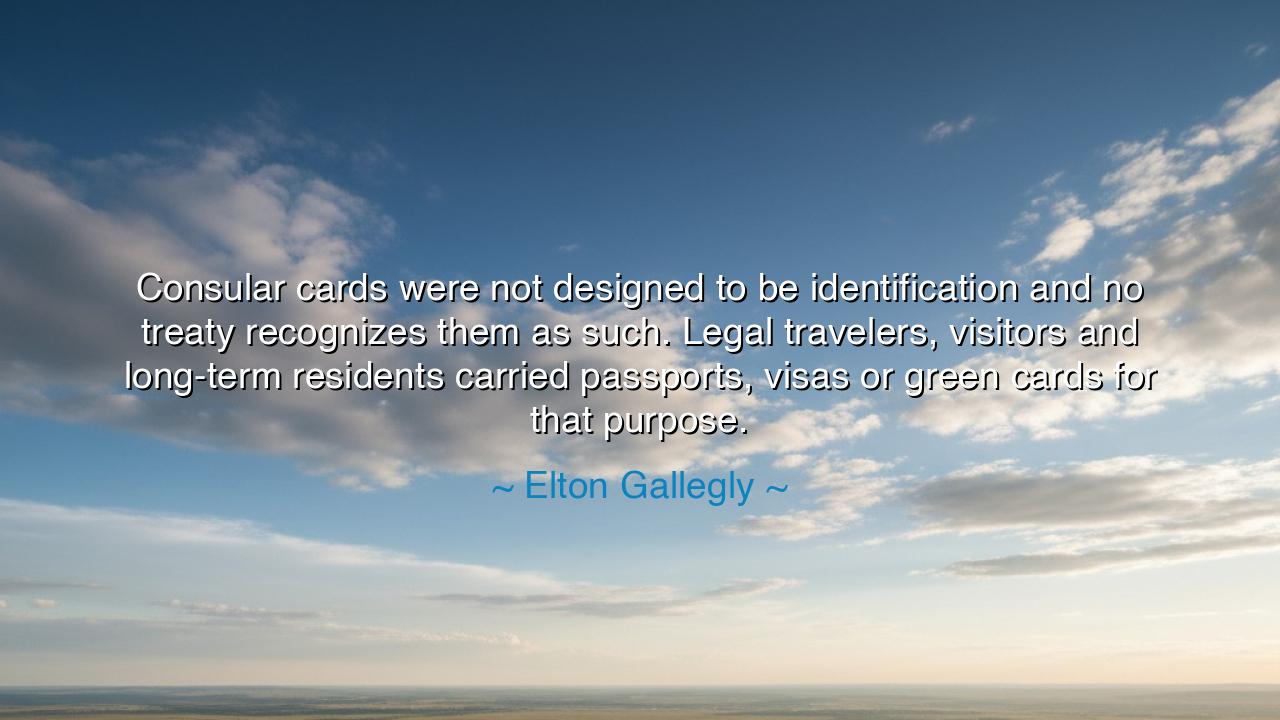
Consular cards were not designed to be identification and no
Consular cards were not designed to be identification and no treaty recognizes them as such. Legal travelers, visitors and long-term residents carried passports, visas or green cards for that purpose.






When Elton Gallegly declared, “Consular cards were not designed to be identification and no treaty recognizes them as such. Legal travelers, visitors and long-term residents carried passports, visas or green cards for that purpose,” he was not merely reciting a rule of law — he was voicing a defense of order, legitimacy, and the sanctity of national boundaries. His words reflect a time of debate and division over immigration and sovereignty, when nations grappled with the balance between compassion and control, inclusion and security. Beneath his statement lies the timeless tension between the human desire for belonging and the political necessity of structure, a dilemma as old as civilization itself.
The origin of this quote lies in the early 21st century, amid the growing controversy over consular identification cards — documents issued by foreign governments, such as Mexico’s Matrícula Consular, to their citizens living abroad, many of whom lacked legal status. Gallegly, a U.S. congressman known for his firm stance on immigration law, sought to clarify that such cards held no standing under international law, and that only recognized documents — passports, visas, or green cards — could confer legitimate identity. His words were not merely administrative; they were a call to reaffirm the rule of law in an era where political emotion often clouded legal precision.
Yet, his statement also carries echoes of a broader, almost philosophical truth — that identity and legitimacy cannot be self-declared; they must be recognized through order and covenant. Since the earliest days of empire, from the city-states of Greece to the bureaucracies of Rome, citizenship and legal identity were more than personal claims; they were contracts between the individual and the state. In those ancient days, to carry a seal, a charter, or a writ was to bear the acknowledgment of one’s belonging to the laws and protections of a given realm. Without it, one was an exile — a soul adrift between lands, without a nation to claim or defend them. Gallegly’s words thus resonate with this old truth: that law, though cold, is the structure upon which peace is built.
But there is also a human story behind the law. Consider the tale of the wandering merchant in medieval Europe, who traveled across borders with letters of passage stamped by the rulers of each land. If he lost these papers, he was at the mercy of every guard and lord he met, a stranger in all territories. Yet if he bore the proper seals, he was protected — his person and goods respected under the codes of trade and travel. This ancient story mirrors the same principle Gallegly defends: that lawful identity ensures dignity and safety, while unrecognized status invites peril and misunderstanding. To carry legitimate papers was not only a legal act — it was a declaration of trust between the individual and the governing order.
Gallegly’s insistence that “no treaty recognizes consular cards as identification” is therefore not a denial of humanity, but a reminder of the fragility of international trust. Treaties, those solemn promises between nations, are the bones of the global order. Without them, recognition collapses into chaos; every border becomes porous, every agreement uncertain. To uphold the integrity of documents like passports and visas is to preserve the mutual respect that binds nations together. A passport is more than paper — it is the voice of a state saying, “This one is mine; I vouch for their name, their origin, their right to cross.” To erode that system is to weaken the invisible web of civility that holds the world in balance.
Yet, his words also invite reflection on the plight of those who fall between laws — those whose need for safety or livelihood leads them into the shadows of legality. The ancient prophets would remind us that justice without mercy becomes tyranny, just as mercy without law becomes anarchy. In this tension lies the challenge of every great nation: to protect its borders without hardening its heart. Gallegly’s quote, though rooted in legality, should not be heard as a rejection of the individual, but as a plea to honor the balance between compassion and structure, so that aid and acceptance may be granted not through chaos, but through channels that preserve both dignity and order.
The lesson in this quote, for all generations, is that civilization depends upon recognition — upon the shared belief that rights and identities must be anchored in lawful covenant. To respect law is to protect justice, and to respect justice is to safeguard the humanity that law is meant to serve. Let the traveler carry his papers, let the nations guard their treaties, but let them also remember the deeper truth: that the ultimate purpose of law is not exclusion, but harmony. For without law, there can be no peace — and without compassion, law itself becomes hollow. The wise must therefore labor to uphold both: the letter that preserves order, and the spirit that sustains humanity.






AAdministratorAdministrator
Welcome, honored guests. Please leave a comment, we will respond soon